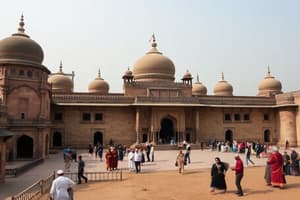Podcast
Questions and Answers
What marked the beginning of the Delhi Sultanate?
What marked the beginning of the Delhi Sultanate?
- The capture of Delhi and its establishment as the capital (correct)
- The expansion of the Sultanate's territories
- The declaration of independence from the Mughal Empire
- The conquest of Bengal
Who established the Delhi Sultanate in 1192?
Who established the Delhi Sultanate in 1192?
- Ghurid Empire
- Aram Shah
- Qutb-ud-din Aibak (correct)
- Shams-ud-din Iltutmish
Which of the following was a significance of the Delhi Sultanate?
Which of the following was a significance of the Delhi Sultanate?
- The establishment of the Mughal Empire
- The development of the Hindi language
- The introduction of Christian missionaries in India
- The establishment of Muslim rule in India (correct)
Who was the nephew of Qutb-ud-din Aibak and expanded the Sultanate's territories?
Who was the nephew of Qutb-ud-din Aibak and expanded the Sultanate's territories?
What was the legacy of the Delhi Sultanate?
What was the legacy of the Delhi Sultanate?
Which of the following was not a conquest of Qutb-ud-din Aibak?
Which of the following was not a conquest of Qutb-ud-din Aibak?
What was the origin of the Ghurid Empire?
What was the origin of the Ghurid Empire?
Who appointed Qutb-ud-din Aibak as his governor in India?
Who appointed Qutb-ud-din Aibak as his governor in India?
What is Qutb-ud-din Aibak credited with?
What is Qutb-ud-din Aibak credited with?
What occurred in the Delhi Sultanate after Aibak's death in 1210?
What occurred in the Delhi Sultanate after Aibak's death in 1210?
Who eventually emerged victorious and established himself as the ruler of the Delhi Sultanate after the succession crisis?
Who eventually emerged victorious and established himself as the ruler of the Delhi Sultanate after the succession crisis?
What is Iltutmish described as?
What is Iltutmish described as?
Flashcards are hidden until you start studying
Study Notes
The Foundation of the Delhi Sultanate
Background
- The Delhi Sultanate was a Muslim kingdom that existed from the 12th to the 16th century in the Indian subcontinent.
- It was established by Qutb-ud-din Aibak, a Turkish slave-soldier who rose to become a powerful general in the Ghurid Empire.
Founding of the Delhi Sultanate
- In 1192, Qutb-ud-din Aibak declared independence from the Ghurid Empire and established the Delhi Sultanate.
- He captured Delhi and made it his capital, marking the beginning of the Delhi Sultanate.
Early Rulers and Expansion
- Qutb-ud-din Aibak (1192-1210): Established the Delhi Sultanate and expanded its territories through military campaigns.
- Aram Shah (1210-1211): Son of Qutb-ud-din Aibak, but his reign was short-lived and marked by instability.
- Shams-ud-din Iltutmish (1211-1236): Nephew of Qutb-ud-din Aibak, who consolidated power and expanded the Sultanate's territories.
Key Conquests
- Qutb-ud-din Aibak conquered:
- Delhi
- Ajmer
- Kanauj
- Banaras
- Shams-ud-din Iltutmish conquered:
- Bengal
- Bihar
- Eastern Uttar Pradesh
Significance of the Delhi Sultanate
- Established Muslim rule in India, which would last for centuries.
- Introduced Persian and Arabic languages, which influenced the development of Urdu.
- Promoted the development of Indo-Islamic architecture, art, and culture.
Legacy
- The Delhi Sultanate laid the foundation for the Mughal Empire, which would later dominate the Indian subcontinent.
- Its legacy can be seen in the many monuments, mosques, and architectural wonders that still stand in Delhi and surrounding areas.
Studying That Suits You
Use AI to generate personalized quizzes and flashcards to suit your learning preferences.




